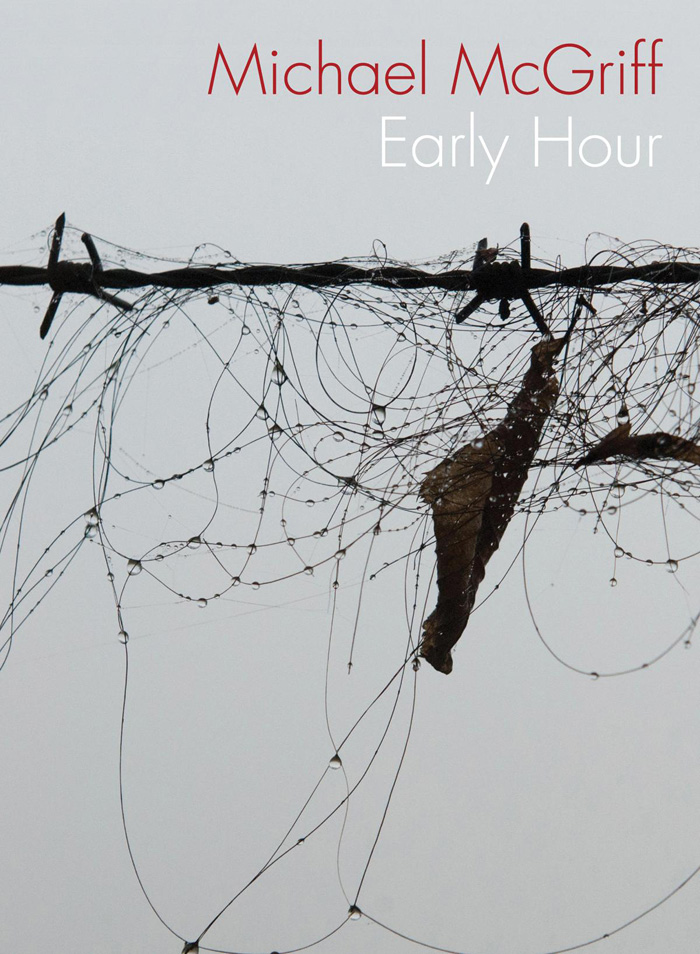A review of Michael McGriff’s Early Hour
December 2017 | The Kenyon Review
In a world that often feels on the brink of collapse, Michael McGriff’s third collection uses a sequential long form to create a verdant space for meditative contemplation. And he does so seamlessly. In fact, Early Hour synthesizes McGriff’s interests in rural American landscapes, the people who live and work in them, and postindustrial decay. However, this hauntingly beautiful song cycle, like German Expressionist Karl Hofer’s 1935 oil painting Frühe Stunde that inspired it and shares its name, conjures narrative not through direct representation but through distillation, suggestion, trace.
In one sense, McGriff seems to have arrived at this synthesis incrementally; his first book, Dismantling the Hills (The University of Pittsburgh Press, 2008), explores contextually specific concerns of person and place explicitly, whereas his second collection, Home Burial (Copper Canyon Press, 2012), implies them. However, the transmutation of Early Hour represents an exciting leap forward in terms of the atmospheric condition McGriff conjures. Dreamlike in its movements from one scene—one partially fractured lyrical moment—to the next, Early Hour achieves a kind of sublimity rarely present in contemporary American poetry.
Part of Early Hour’s departure, formally and thematically, revolves around the relationship between the speaking subject (“I”) and the other (“You”), a relationship marked by alternating states of tension, mystery, and intimacy. Particularizing these lyric figures, McGriff creates characters mysterious enough to seduce us into reading the sequence straight through. The opening title poem begins with this characteristically rich evocation of place:
In the early hour.
In the hour of copper.
In the secret minutes
coiled around wooden spools
and scrawled into the sill dust
beneath our open window.
Shortly afterward, the speaker ups the ante of “secret minutes” through the introduction of the beloved:
You are asleep, the dog
collapsed between us,
the shadows across your stomach
umber-flecked and swimming
toward some vague memory of blue
that the early hour
has wrung from its hair.
Your breath smells of farriers’ hammers,
of April spreading its sheer fabric
among the first blooms
of the dogwoods.
This description’s incantatory eroticism begins the sequence with a quiet intensity that runs throughout.
And as the “early hour,” the poem’s object of meditation, shifts, the “you” also shifts: from embodied to disembodied (and back). Take, for instance, the melding of the line “you become the early hour,” or the poem’s ending: “as you drift within your body / and into an hour as nameless / as the stone heart of a plum.” Infrequently has a state of physical and metaphysical liminality felt as inviting or as numinous. Extending the psychic leaps that characterize the work of so-called deep image poets such as James Wright, the places and moods of Early Hour feel at once uncannily familiar and otherworldly.
One of the ways in which McGriff applies pressure on this poetics instead of merely recycling it is by providing a specific historical moment in which the sequence occurs. Set against the backdrop of what McGriff has called the “impending doom of the 1940s,”[1] Early Hour bears the marks of troubled times. The horse in “Why I Am Obsessed with Horses,” for example, “separat[es] two countries,” says “My name is 1935,” and is associated with a list of haunted objects and attributes, including “its zodiac / of shrapnel-bright stars,” “the glass hutch of memory,” “an empty stockyard,” and finally as the self-described “source of all echoes.”
Whereas “Why I am Obsessed with Horses,” like many other poems across the sequence, uses history’s dark trace to create an eerily familiar world of decay, poems such as “Communiqué” directly take up the crises of a world at the brink of war. “Communiqué” begins,
We’ve been told
it’s worse in every direction,
that it’s safest to stay
exactly where we are.
We’ve been told
it’s best to divorce ourselves
from the old system
and adopt the new system
Here, as in much of the collection, McGriff uses anaphora, lineation, and form to create a rhythm that transfixes us. In this case, the poem begins by intoning a march or list of directives. Within the limitations of the lockstep of these quatrains, McGriff ventures away from the intimacy of lyric address to the public form, “We.” As an official statement, “Communiqué” stands in stark contrast to the poems that surround it.
However, as the poem progresses, the counterpoint of statement moves into description and is ultimately subsumed into the lyric voice of the sequence’s now familiar speaker. The poem ends:
I hear vines
growing up through the lake.
They reach for the moon
like the hair of the dead.
What began as a statement-driven communiqué ends as a populated, historicized pastoral. By personifying vines as “hair of the dead,” McGriff has nature speak (and be heard) on the subject of human devastation. In fact, the membrane between the natural world and the human world is rendered so porous throughout Early Hour as to recall the dramatic tension of Theocritus’s Idylls. Debunking the common misperception that pastoral poetry involves a separation from historical realities, in McGriff’s sequence, human and natural fate are inextricably entwined.
“A book written in coal smoke,” like the one the speaker of “Skipping a Funeral” admits to “reading, / but not really reading,” Early Hour progresses as a fugue set at a darkly liminal time, like ours. And throughout Early Hour, McGriff weaves in a series within the sequence: the “Black Postcard” poems that the poet notes “borrow their titles from a poem by Tomas Tranströmer and are dedicated to his memory.” Punctuating the sequence, these briefly recalled moments or postcards render the collection all the more dreamlike, surreal, and uncanny. One begins, “In my dream / a farm is requisitioned / and I fall through myself / one color at a time”; another begins, “The mineral shadow rising / from the ruined mouth of the city / drifts across the blood moon.” Again and again, McGriff transports us to a world just this side of the one we recognize as our own.
In McGriff’s hands, power is ultimately most concentrated in dream logic, not dogma. Take this ending of “Cosmology for the New Year,” for instance:
In the moment between
the end of one longing
and the beginning of another
I hear the boundary waters
of this century in your hair
and cross them by horse.
Cross we must. Fortunately, we have McGriff’s music to carry us.
[1] Interview with Tarn Painter-MacArthur on Fogged Clarity: http://foggedclarity.com/article/michael-mcgriff/

Michael McGriff | Early Hour
Copper Canyon Press | 2017 | 58 pages
9781556595073

